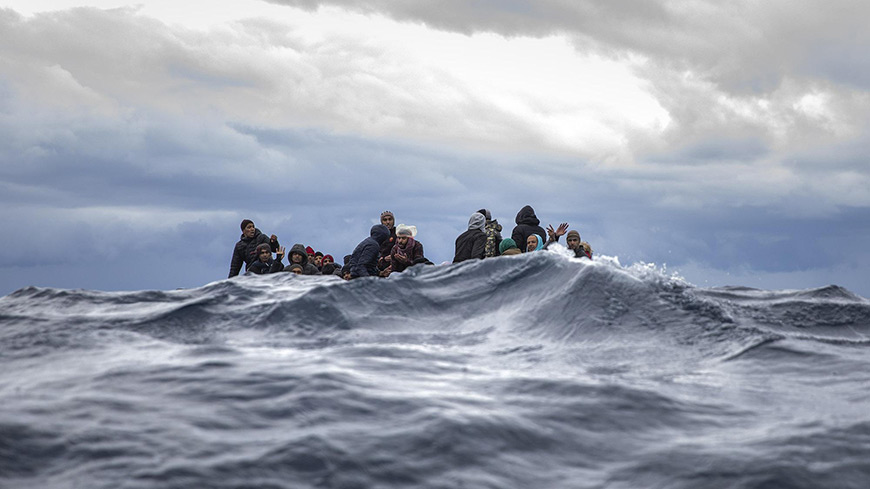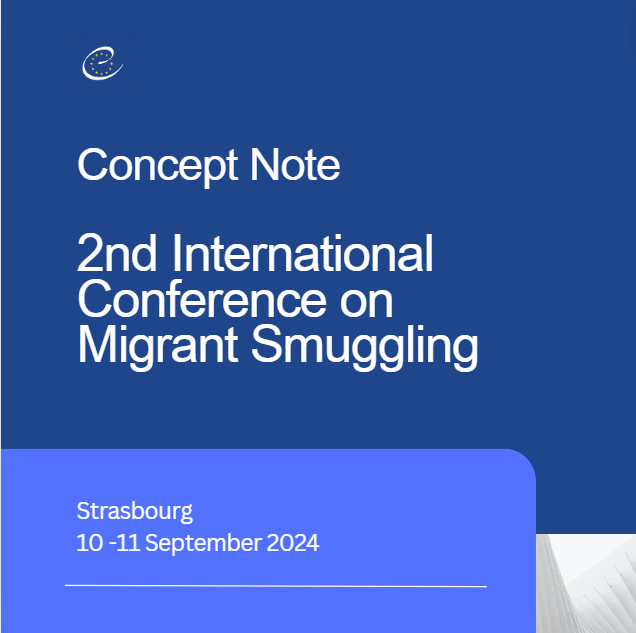2nd International Conference on Migrant Smuggling
Enhancing international cooperation in tackling migrant smuggling
Strasbourg
10-11 September 2024
The Conference is organised under the auspices of the
European Committee on Crime Problems (CDPC), in collaboration with the Office of the Special Representative on Migration and Refugees

Countering migrant smuggling is identified as a priority in the decisions of the Council of Europe Heads of State and Government at their 4th Summit held in Reykjavik on 16-17 May 2023. The European leaders stated in the Reykjavík Declaration:
“We recall the increasing challenges of migration and the necessity to fight against trafficking and smuggling of migrants. We commit to intensifying efforts to foster and improve international co-operation in this regard, while continuing to protect the victims and respect the human rights of migrants and refugees, as well as supporting frontline States, within the existing Council of Europe frameworks”
The aim of the Conference is to foster enhanced international cooperation, discuss the effectiveness of the existing legal frameworks and any possible gaps, share best practices, and explore comprehensive measures needed for effectively countering migrant smuggling. These measures aim to prosecute smugglers while protecting the rights and dignity of migrants and avoiding the criminalisation of humanitarian assistance.
The topics to be examined include:
International cooperation: Essential for combating a crime that is transnational by nature. Cooperation between Council of Europe member states, as well as between these states and third countries where most migratory flows originate, still needs to be reinforced.
Legal frameworks: Both international and national legal frameworks related to migrant smuggling may need to be clarified, enhanced, or completed. This pertains to the criminalization of offenses as well as the protection of victims of smuggling and those who assist them.
Investigation and prosecution of migrant smuggling: These may include a lack of clarity regarding criminalization, aggravations, and penalties related to this offense.
Participants may also wish to examine issues such as:
- Protection of victims: This includes considerations for vulnerable persons, the gender dimension, and the rights of witnesses and collaborators of justice.
- Addressing new criminal techniques: This involves the use of modern technologies and financial tools to facilitate migrant smuggling.
- Links between migrant smuggling and other crimes: These include money laundering, corruption, child labor, sexual slavery, human trafficking, drug trafficking, etc. The Council of Europe's monitoring processes, notably GRECO and MONEYVAL, are important assets in this endeavor.Furthermore, as migrant smuggling increasingly occurs online, E-evidence and investigative capabilities are needed to tackle it. The Council of Europe's cybercrime instruments and cooperation forums can be very relevant in this respect.
Speech by Council of Europe Secretary General Marija Pejčinović Burić - International Conference on a Global Alliance to Counter Migrant Smuggling, Brussels, 28 November 2023
Background information
Recent tragedies have shown that migrants continue to attempt irregular avenues and dangerous routes and increasingly turning to smugglers. This puts their lives at risk and exposes them to serious human rights violations. These smugglers exploit legal loopholes and jurisdictional gaps, including inconsistent or imprecise definitions, which can hinder international cooperation in prosecuting smugglers while protecting migrants. Additionally, inadequate enforcement and insufficient penalties fail to deter these criminal activities.
Corruption and other crimes further undermine anti-smuggling efforts. Maritime smuggling and smugglers operating within broader criminal or financial networks present specific challenges. While imposing clear legal consequences for smugglers can reduce these activities, it is crucial not to criminalise migrants and to protect their rights.
The Council of Europe's treaties, mechanisms, and standards on mutual legal assistance in criminal matters are pertinent for cooperation between EU member states and non-EU states parties to these treaties in countering migrant smuggling.
Most of these treaties are also open to third countries, which is vital since the geographical scope of cooperation and coordination against migrant smuggling extends beyond Europe.
The European Committee on Crime Problems (CDPC) of the Council of Europe has been actively engaged in addressing the issue of migrant smuggling and has developed the 2020 Action Plan on Fostering International Co-operation and Investigative Strategies in Fighting the Smuggling of Migrants. The Action Plan, still being implemented, has underscored the importance of complementarity and cooperation with other international actors. The Council of Europe Network of Prosecutors on Migrant Smuggling, established within the Action Plan, has met annually in recent years. CDPC delegations have also developed country profiles outlining legal and judicial information on migrant smuggling, which other countries can utilise.
Following the Reykjavik Declaration, the Committee of Ministers of the Council of Europe tasked the CDPC with preparing a report assessing the need for and feasibility of a possible instrument in the field of migrant smuggling. This report is to be finalised by the end of 2024.
The CDPC is carrying out this exploratory work in consultation with the Special Representative of the Secretary General of the Council of Europe on Migration and Refugees and his office.



